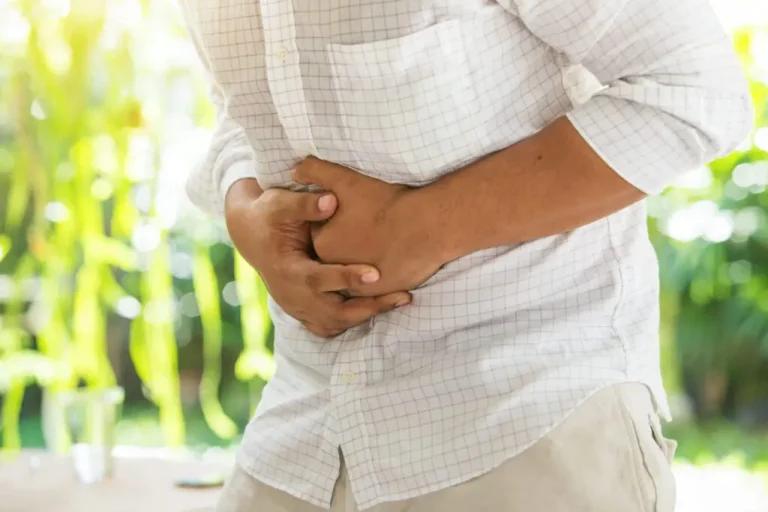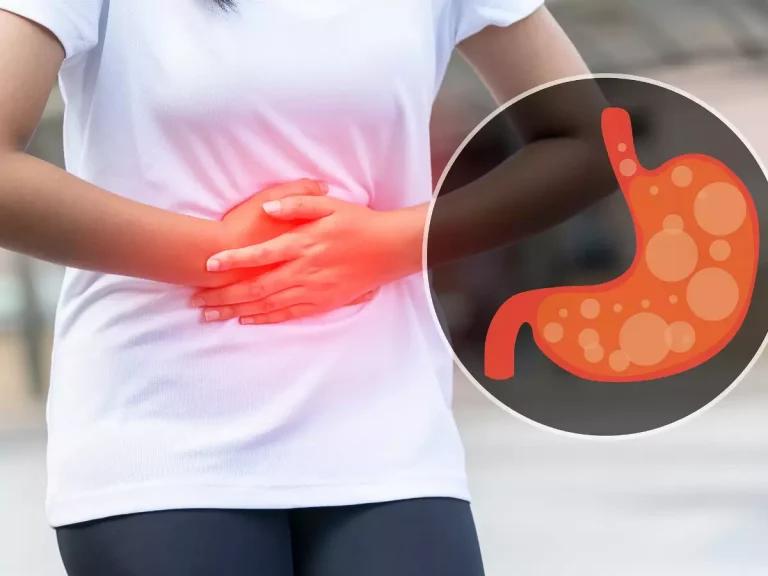

December 22, 2025 (Current Version)
March 28, 2025
70 per cent of Americans regularly suffer from stomach bloating, with Irritable Bowel Syndrome (IBS), acid reflux and constipation as three of the most common causes.
Stomach bloating is when your belly inflates and you feel uncomfortable. It’s often when you have too much gas that clogs up your gastrointestinal tract (GI tract). You may attribute bloating to eating certain foods and drinks such as fizzy drinks, broccoli, beans or too many fruits and vegetables. While this is a common cause of bloating, there are times when your bloating could signal something more serious.
Abdominal bloating is usually nothing to worry about and generally can be attributed to poor diet, intolerance or a gut problem often on the left side. Symptoms of a bloated stomach vary. Some people notice that their belly looks swollen or misshapen or may experience sharp stomach pain or abdominal pain. Some people bloat when stressed (especially if they suffer from irritable bowel syndrome) or before, during or after their menstrual cycle.
Ovarian cancer bloating is due to a buildup of fluid (ascites) in the abdomen and can also come with pain. Risk factors include taking medication such as tamoxifen, estrogen supplements that don’t contain progesterone, radiation therapy, a family history of uterine cancer or a family history of inherited colon cancer called Lynch syndrome.
How do I know if my bloating is serious? Read on to discover five signs indicating it may be time to see your doctor.
1. Weight loss
Weight loss alongside continual bloating should be explored by your GP, especially if the weight loss was not part of a lifestyle change.
Weight loss can be caused by tumours that press on the intestines, making you feel full after just a small amount of food.
2. Changes in bowel movement
Out-of-the-ordinary changes in your bathroom habits, such as continuous diarrhoea, needing to go more frequently, or blood in your stools, may indicate that you have something which requires medical attention.
Constipation may cause or exacerbate symptoms of bloating. Painful bloating could signal a bowel obstruction or a blockage in the small or large intestine.
Bloating with frequent tummy pain and the runs can often be a sign of inflammatory bowel diseases such as Crohn’s disease or ulcerative colitis, both of which cause inflammation of your digestive tract. Crohn’s disease is an autoimmune disorder that affects the GI tract, usually in the small intestine or colon.
Crohn’s disease can cause narrowing of the intestines and lead to a bowel obstruction, resulting in severe bloating, weight loss, nausea and vomiting after meals. Other symptoms may be present outside of the GI tract, including mouth ulcers, joint pain, skin lesions and eye inflammation.
A swollen belly accompanied by unusual stools could be a sign of cancers like breast cancer, pancreatic, colon or stomach cancer, if cancer appears along the lining of the abdominal cavity or liver disease.
3. Fatigue
Continual tiredness combined with bloating can be attributed to many things but shouldn’t be ignored. If you have Coeliac disease, eating foods containing gluten can trigger diarrhoea, abdominal pain and fatigue.
4. Appetite changes
If you’re starting to feel full when eating less or find you lose your appetite, speak to your GP about your symptoms.
Frequent indigestion that does not appear to be associated with food or other apparent causes could be a sign of something more serious. Possible causes include a stomach ulcer, cancer or liver failure.
5. Continual bloating
If you have bloating that doesn’t seem to reside and is really painful, it is advisable to get advice from your doctor.
A bloated stomach and stomach fullness are symptoms of excessive gas in the stomach. While you can ingest gasses by swallowing air while eating certain foods, smoking and chewing gum or drinking carbonated beverages, these gasses mostly escape through belching before they reach your intestines. Otherwise, they tend to pass as flatulence.
The most common foods that cause problems are wheat, gluten or dairy. Coeliac disease is a common digestive condition where your intestine cannot absorb gluten found in wheat, barley and rye. If you have Coeliac disease, eating foods containing gluten can also trigger diarrhoea, abdominal pain and fatigue. Lactose intolerance is associated with many digestive symptoms, including bloating. Lactose is the main carbohydrate in milk.
If your stomach bloating is caused by diet or alcohol, you can help prevent it by making some lifestyle changes.
FAQ’s
What does bloating feel like?
Bloating is a feeling of discomfort in your stomach due to an accumulation of gas and fluid. It can be tight, you feel full which often makes clothing too restrictive for comfortable wear. Bloating may also cause cramping and abdominal pain, making it hard to get through the day. The increased gas in the stomach can lead to burping or passing gas more frequently, a very embarrassing symptom. This feeling can occur at any time but is commonly reported after meals when the stomach has run out of room with excess gas. Other causes can be hormonal changes or even swallowed air. If you struggle with bloating, remember you’re not alone, there are ways you can treat this uncomfortable feeling.
Why am I still bloated after pooping?
Pooping is a normal and natural part of life, it’s important to remember that when it comes to digestive issues like bloating, the source of discomfort can vary from person to person.
In most cases, feeling bloated after pooping can be caused by what we have eaten; for example, dairy or high-fibre foods may cause you to feel puffy afterwards. Another possible culprit is gas that hasn’t been released during your bathroom session. Another reason could be an indication of food intolerances or food allergies; it could mean your body isn’t digesting and absorbing important vitamins and minerals as it should. Sometimes it could be a sign that something else is wrong with your digestive system, such as coeliac disease, irritable bowel syndrome (IBS) or lactose and fructose intolerance.
If the bloating persists or worsens during or after pooping, it’s probably wise to bring this up with a doctor, as other underlying conditions could be at play. But overall, intestinal bloating after a bowel movement is almost always caused by something dietary or related to an accumulation of gas in your digestive tract.
How do I know if my bloating is serious?
Knowing the difference between occasional bloating and a serious condition is important. Fortunately, several telltale signs can help you understand if your bloating is something to be concerned about.
If your bloating is accompanied by abdominal pain, cramps, dizziness, nausea or vomiting, then it might be a serious problem. Regularly occurring bloating that doesn’t improve with lifestyle changes, such as eating smaller meals or avoiding certain foods, may also point to a more serious issue. Other symptoms like weight loss or blood in the stools could also indicate a medical problem and warrant further investigation.
Speak with your doctor if you have any concerns so they can determine whether additional testing or treatments are advisable. Taking charge of your health starts by understanding the information available and making informed decisions to stay well.
Why does my stomach feel stiff when I press on it?
Feeling bloating in the abdomen is a very common complaint. When bloating is present and you press on your stomach, it can feel challenging because bloating causes abdominal swelling that puts pressure on the stomach wall.
Bloating can be caused by different factors, including overeating, eating gassy foods, irritable bowel syndrome or even swallowing air while talking. It’s important to discuss these sensations with your healthcare provider to make sure you can identify any underlying medical issues and take the necessary steps towards relieving bloating symptoms.
How do I treat bloating?
Dealing with bloating can be uncomfortable and even embarrassing at times, which is why many people are interested in over-the-counter treatments. These treatments typically involve common medications like antacids, laxatives or probiotics, which help to neutralise stomach acid and restore a natural balance in the digestive system.
Bloating presents common symptoms like abdominal discomfort, abdominal distension/swelling and burping. Fortunately, several simple self-care strategies like decreasing the intake of common trigger foods (e.g. full-fat dairy products, cruciferous vegetables like broccoli), drinking plenty of water, engaging in regular physical activity and taking specialised supplements can help to reduce its severity.
Talk to a healthcare provider to learn more about potential over-the-counter treatments for bloating that may be right for you. Unfortunately, these treatments don’t always solve more severe cases of bloating, so it is important to consult a doctor if you experience bloating regularly.
How long can bloating last?
Bloating is an uncomfortable and sometimes painful sensation that most people have experienced at one point in their lives. This distention of the abdomen can vary in severity and duration – some episodes of bloating may only last a few minutes, while others can persist for many days.
If bloating lasts longer than three days, it is important to seek advice from a medical professional as it may indicate a more serious underlying condition that needs further investigation. Eating small portions frequently, avoiding certain gassy foods and drinking plenty of water are all helpful ways to manage and reduce periods of excessive bloating.
What are the causes of a bloated tummy in ladies?
A bloated tummy can be caused by fibroids or endometriosis in women. Fibroids are benign uterus tumours and may cause bloating because they can push on other organs, such as the bladder and the intestines. In addition, fibroids can produce hormones like estrogen, which cause an increase in the buildup of fats in your abdomen, leading to discomfort and a bloated feeling. Endometriosis is another condition where tissue similar to the uterine lining grows outside the uterus, causing pain and a bloated stomach from fluid accumulation. Other causes include premenstrual syndrome, food allergies or sensitivity, irritable bowel syndrome (IBS) and consuming large amounts of carbohydrates or sodium-rich foods. It is always important to receive a proper medical diagnosis if you have a bloated stomach, as it could be a symptom of other conditions.
I have a bloated stomach, feel sick and tired, and I am female. Should I be worried?
If you are a female experiencing a bloated stomach and feel sick or tired, please take it seriously. Although the symptoms can be minor, they can also indicate underlying health issues that you should check out. The lack of energy or upper abdominal pain could be caused by inflammation or digestive problems such as IBS, food sensitivities, hormonal imbalances or certain infections.
To help ensure that there isn’t something serious going on with your body, it is always best to seek medical attention from your doctor if the symptoms don’t subside after a few weeks. An accurate professional diagnosis will help you find the best possible treatment plan to start feeling better.
I have a bloated stomach, feel sick and tired, and I am male. Should I be worried?
If you’re male and constantly feeling bloated, it could be a sign of something bigger. This type of tension or pressure in the stomach accompanied by fatigue or feeling sick can be symptoms of many health issues, from simple digestive problems to more serious illnesses like diabetes or liver disease.
It’s important to speak with your doctor if you are experiencing these symptoms regularly, so they can rule out any underlying problems and offer a diagnosis. In many cases, lifestyle changes such as diet and exercise modifications can result in symptom reduction if no other underlying issue is present.
I am feeling bloated and sick after eating. Should I be concerned?
After overindulging in food, it’s common to experience bloating and overall discomfort. Bloating is caused by increased gas production within the digestive tract, which certain foods can trigger like those high in fibre, sulfur-containing compounds or sugar alcohols. Eating too quickly or consuming large amounts of food can also contribute to these unwanted symptoms.
To avoid feeling bloated and sick, try eating slowly and taking smaller bites to help control your appetite. Spacing meals throughout the day can also help keep you from over-consuming calories at once. Eating healthy foods and managing portion sizes are important steps in avoiding uncomfortable sensations after eating.
Is gas a sign of bloating?
True bloating is a feeling of fullness, tightness and pressure, that can cause discomfort in the abdominal area. Gas or trapped wind is one symptom of bloating, but other symptoms can include abdominal distension and pain caused by gas buildup or spasms in the gastrointestinal system. It is also possible to experience bloating without any release of gas.
My stomach has been bloated for a week. What should I do?
Seek medical advice if you have been experiencing bloating for a week or more. There are many causes, ranging from lifestyle factors such as diet, stress and hormonal changes to underlying medical conditions.
What is a low FODMAP diet?
The FODMAP diet stands for Fermentable Oligosaccharides, Disaccharides, Monosaccharides, and Polyols. The theory behind this diet is that by eliminating high-FODMAP foods IBS symptoms may improve. The diet goal is to reduce the fermentation and gas production in the gut providing relief from symptoms like bloating, abdominal pain, and altered bowel habits.
Working with a healthcare professional or a dietitian experienced in the Low FODMAP diet is useful for proper guidance and support throughout the process. If symptoms are severe you may be referred to the gastroenterology department.
Sources
Medical Disclaimer
NowPatient has taken all reasonable steps to ensure that all material is factually accurate, complete, and current. However, the knowledge and experience of a qualified healthcare professional should always be sought after instead of using the information on this page. Before taking any drug, you should always speak to your doctor or another qualified healthcare provider.
The information provided here about medications is subject to change and is not meant to include all uses, precautions, warnings, directions, drug interactions, allergic reactions, or negative effects. The absence of warnings or other information for a particular medication does not imply that the medication or medication combination is appropriate for all patients or for all possible purposes.








